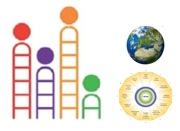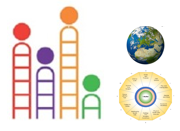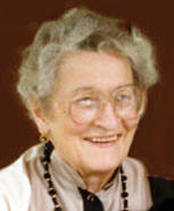5 Reasons Attachment Theory is Important for Professionals and Parents
Attachment Theory? What's that? In my work I regularly encounter significant lack of understanding amongst professionals and parents about the meaning or relevance of Attachments for those who work with children. However in my view Attachment Theory is one of the most important areas of psychological thinking for anyone who works with children with complex needs. It is one of the key foundations of the practical framework that I call The I Matter Framework.
Attachment Theory refers to a body of work first developed by a researcher John Bowlby and by a research group which included Mary Ainsworth (photo on the left) best known for her work on something called The Strange Situation Studies. These specific studies are some which I think it is vital for all professionals and parents to understand. The original works, listed below, deserve a read if you ever have a very long holiday as they represent an extraordinarily detailed piece of careful observational work, but, if you don't have time for this, even a basic understanding can take you forward.
Attachment Theory is now a very well-established body of work which describes the relationship that a child has with the adult figures on whom he or she depends. It makes a very clear distinction between children who have a secure relationship with their key carers and those who have an insecure relationship. This research has clearly established a powerful link between patterns of early attachment relationships and a wide range of educational and mental health outcomes.
Here are 5 reasons why I think Attachment Theory is so important:
1. Attachment Theory provides a universal framework - that helps us to understand ourselves and our own reactions, not just those of our children
An attachment refers to the relationship that a younger vulnerable person develops with a bigger more powerful older figure that he/she depends upon - it is usually used to describe the relationship between a infant and his or her first primary carers. Attachment Theory draws our attention to the fact that for young children this need to depend on someone else for care is as universal and fundamental as hunger. As children we all had a basic need to look to the adults who were responsible for our care and to whom we depended totally for our safety and survival. The challenge of growing up is to learn to transfer some of these needs for assistance to ourselves. However, loss of access to the adult we depended upon when we were small was very alarming to all of us. As adults, we know this rationally to be true, but it is interesting to me how as adults we can forget that we are now the adults on whom our children legitimately depend for their experience of safety and wellbeing when they are feeling wobbled. Attachment Theory invites us to think about ourselves and our own reactions as they are influenced by our own past experiences and this awareness can increase our sensitivity to why so many of our most complex children really are struggling in their relationships today.
2. Attachment Theory helps us tie many diverse observations together in educational practices and in mental health
A huge body of research has now demonstrated that early attachment histories are powerful predictors of educational and mental health outcomes. Children with a relatively secure attachment history with key carers (ie children who have parents who are responsive and helpful in attending to their physical and emotional needs) tend to be more prosocial and skilled in co-operative relationships, they tend to feel better about themselves and have better mental health and they tend to experience greater ease of learning in the classroom. Relative security of attachment clearly is an important variable.
3. Attachment Theory provides a developmental understanding for a wide variety of challenges seen in complex children that become labelled as if they are discrete issues.
In work with complex children there is a very powerful drive to try to label behaviour that challenges adults as discrete psychiatric disorders: ASD, ADHD, ODD, OCD, Anxiety Disorder, Depressive disorder, Reactive Attachment Disorder. This labelling tends to suggest separateness. Implicit is the belief that if we can give a cluster of symptoms a name, we may be able to find a useful discrete drug or 'treatment' that helps. Apart from the obvious concern about more and more children being prescribed medication because a certain label appears on file, this labelling of the child too often prevents adults from thinking about the relationship issues in which they are personally involved, and the way in which these difficulties are so often connected.
4. Attachment Theory encourages us to focus on relationships between children and their key carers not just on the child.
As a psychologist and an educationalist, I am interested in understanding how different patterns of behaviour develop in the context of relationships. We know there can be genetic vulnerabilities to specific challenges, but more often than not, challenging behaviour, poor learning, or mental health issues develop when there has been a sensory processing issue, a disruption to the relationship or more critically a poor fit between the fundamental needs of a child, and the adult care and life opportuntiies that is and have been provided. We have very little control over a child's DNA or sensory processing (at least not yet!) and even as adults there are a lot of things we cannot controrl, but adults do have control over their own choices. So learning to fit our care provision to the needs of the child rather than expecting them to adapt to us, beyond their capabilities, is a process that can make a powerful difference to a wide variety of outcomes.
5. Attachment Theory provides a very clear and practical direction of travel for therapeutic and educational work
it is important to remember that the distinction between secure and insecure is NOT a value judgement - a securely attached child or adult is not BETTER than an insecurely attached person. On the contrary, insecurity in attachment relationships can become a powerful driver for achievement in business for example. However, given that there is such a powerful body of evidence of the benefits of greater security in our key attachments, for both mental health and for educational outcomes, attachment theory can provide a very strong framework to guide the priorities of our policy making and practices. Thus any step that can be taken to encourage key adults to respect and respond appropriately to a child's attachment needs and thus increase their attachment security will be fundamentally important ones.
Attachment Theory is an extremely powerful organising framework. In The I Matter Framework therefore, attachment relationships form one of the most important organising ideas in the frame, but attachment is not the only organising idea. I have found that by adding in ideas that are well-described or more elaborated in other psychological approaches, an even more powerful and practical framework can emerge. More on this in future blogs!
How much have you read about Attachment Ideas? Let me know how they have influenced you, or what you would like to know more about!
You can find out more about I Matter Courses Here
References:
Attachment Theory refers to a body of work first developed by a researcher John Bowlby and by a research group which included Mary Ainsworth (photo on the left) best known for her work on something called The Strange Situation Studies. These specific studies are some which I think it is vital for all professionals and parents to understand. The original works, listed below, deserve a read if you ever have a very long holiday as they represent an extraordinarily detailed piece of careful observational work, but, if you don't have time for this, even a basic understanding can take you forward.
Attachment Theory is now a very well-established body of work which describes the relationship that a child has with the adult figures on whom he or she depends. It makes a very clear distinction between children who have a secure relationship with their key carers and those who have an insecure relationship. This research has clearly established a powerful link between patterns of early attachment relationships and a wide range of educational and mental health outcomes.
Here are 5 reasons why I think Attachment Theory is so important:
1. Attachment Theory provides a universal framework - that helps us to understand ourselves and our own reactions, not just those of our children
An attachment refers to the relationship that a younger vulnerable person develops with a bigger more powerful older figure that he/she depends upon - it is usually used to describe the relationship between a infant and his or her first primary carers. Attachment Theory draws our attention to the fact that for young children this need to depend on someone else for care is as universal and fundamental as hunger. As children we all had a basic need to look to the adults who were responsible for our care and to whom we depended totally for our safety and survival. The challenge of growing up is to learn to transfer some of these needs for assistance to ourselves. However, loss of access to the adult we depended upon when we were small was very alarming to all of us. As adults, we know this rationally to be true, but it is interesting to me how as adults we can forget that we are now the adults on whom our children legitimately depend for their experience of safety and wellbeing when they are feeling wobbled. Attachment Theory invites us to think about ourselves and our own reactions as they are influenced by our own past experiences and this awareness can increase our sensitivity to why so many of our most complex children really are struggling in their relationships today.
2. Attachment Theory helps us tie many diverse observations together in educational practices and in mental health
A huge body of research has now demonstrated that early attachment histories are powerful predictors of educational and mental health outcomes. Children with a relatively secure attachment history with key carers (ie children who have parents who are responsive and helpful in attending to their physical and emotional needs) tend to be more prosocial and skilled in co-operative relationships, they tend to feel better about themselves and have better mental health and they tend to experience greater ease of learning in the classroom. Relative security of attachment clearly is an important variable.
3. Attachment Theory provides a developmental understanding for a wide variety of challenges seen in complex children that become labelled as if they are discrete issues.
In work with complex children there is a very powerful drive to try to label behaviour that challenges adults as discrete psychiatric disorders: ASD, ADHD, ODD, OCD, Anxiety Disorder, Depressive disorder, Reactive Attachment Disorder. This labelling tends to suggest separateness. Implicit is the belief that if we can give a cluster of symptoms a name, we may be able to find a useful discrete drug or 'treatment' that helps. Apart from the obvious concern about more and more children being prescribed medication because a certain label appears on file, this labelling of the child too often prevents adults from thinking about the relationship issues in which they are personally involved, and the way in which these difficulties are so often connected.
4. Attachment Theory encourages us to focus on relationships between children and their key carers not just on the child.
As a psychologist and an educationalist, I am interested in understanding how different patterns of behaviour develop in the context of relationships. We know there can be genetic vulnerabilities to specific challenges, but more often than not, challenging behaviour, poor learning, or mental health issues develop when there has been a sensory processing issue, a disruption to the relationship or more critically a poor fit between the fundamental needs of a child, and the adult care and life opportuntiies that is and have been provided. We have very little control over a child's DNA or sensory processing (at least not yet!) and even as adults there are a lot of things we cannot controrl, but adults do have control over their own choices. So learning to fit our care provision to the needs of the child rather than expecting them to adapt to us, beyond their capabilities, is a process that can make a powerful difference to a wide variety of outcomes.
5. Attachment Theory provides a very clear and practical direction of travel for therapeutic and educational work
it is important to remember that the distinction between secure and insecure is NOT a value judgement - a securely attached child or adult is not BETTER than an insecurely attached person. On the contrary, insecurity in attachment relationships can become a powerful driver for achievement in business for example. However, given that there is such a powerful body of evidence of the benefits of greater security in our key attachments, for both mental health and for educational outcomes, attachment theory can provide a very strong framework to guide the priorities of our policy making and practices. Thus any step that can be taken to encourage key adults to respect and respond appropriately to a child's attachment needs and thus increase their attachment security will be fundamentally important ones.
Attachment Theory is an extremely powerful organising framework. In The I Matter Framework therefore, attachment relationships form one of the most important organising ideas in the frame, but attachment is not the only organising idea. I have found that by adding in ideas that are well-described or more elaborated in other psychological approaches, an even more powerful and practical framework can emerge. More on this in future blogs!
How much have you read about Attachment Ideas? Let me know how they have influenced you, or what you would like to know more about!
You can find out more about I Matter Courses Here
References:
- Ainsworth, M. and Bowlby, J. (1965). Child Care and the Growth of Love. London: Penguin Books.
- Ainsworth, M. (1967). Infancy in Uganda. Baltimore: Johns Hopkins.
- Ainsworth, M., Blehar, M., Waters, E., & Wall, S. (1978). Patterns of Attachment. Hillsdale, NJ: Erlbaum.
- Bowlby J (1999) [1969]. Attachment. Attachment and Loss (vol. 1) (2nd ed.). New York: Basic Books.
- Bowlby J (1973). Separation: Anxiety & Anger. Attachment and Loss (vol. 2); (International psycho-analytical library no.95). London: Hogarth Press.
- Bowlby J (1980). Loss: Sadness & Depression. Attachment and Loss (vol. 3); (International psycho-analytical library no.109). London: Hogarth Press.
Categories
- About this blog (1)
- Relationship Health (1)
- Impact Stories (7)
- Nuggets and GEMS (1)
- Audio (1)
- Videos (1)
- Professionals (43)
- Parents-Carers (4)
- Young People (2)
- Workplace (1)
- Schools (4)
- Health (5)
- Theory to Practice (13)
- Recent Feedback (9)
- Why I Matter? (8)
- Miscellaneous (18)
- 2019 (14)
- 2018 (5)
- 2016 (4)
- 2015 (6)
- 2014 (23)
- 2013 (8)



0 comments
Leave a comment
Please log in or register to post a comment